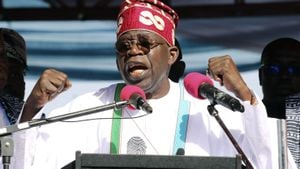With the dust still settling from the 2024 U.S. presidential election, political analysts and citizens alike are buzzing with speculation and analysis about the results and their fallout. Early indications suggest a tightly contested election, with control of Congress hanging by a thread.
Three days post-election, uncertainty looms as numerous congressional races remain uncalled. According to reports, Republicans are poised to grip the House by the narrowest of margins, potentially regaining control amid fierce competition. Meanwhile, the Senate presents its own set of challenges, with two pivotal races still undecided: Nevada and Arizona, where Democratic contenders Jacky Rosen and Ruben Gallego are leading their Republican adversaries, Sam Brown and Kari Lake respectively. If Rosen and Gallego maintain their leads, they could help Democrats secure 47 seats, amplifying political tensions.
Over on the Republican side, Senate leadership positions are up for grabs as party leaders scramble to secure dominance following their tentative majority. Not one to miss the chance to assert authority, President-elect Donald Trump has made waves by announcing Susie Wiles, his campaign manager, as his White House chief of staff. This decision indicates Trump's intent to wield significant influence over his administration from day one.
Interestingly, the election wasn't just about who's winning or losing. It also spotlighted serious concerns about election integrity and security. Reports have emerged detailing efforts by foreign adversaries, particularly Russia and Iran, to meddle with the electoral processes and sow discord among U.S. voters. U.S. intelligence agencies have walked reporters through the chilling tactics these nations might employ, including the amplification of incendiary rhetoric and potential calls for physical protests after the votes were cast.
Jen Easterly, head of the U.S. Cybersecurity and Infrastructure Security Agency, highlighted the unprecedented levels of foreign disinformation circulating this election season, stating, "Disinformation is being peddled by foreign adversaries at a greater level than ever before." While isolated attempts to disrupt operational aspects, such as election computer systems and ballot drop boxes, were observed, officials assured the public there exists no evidence to suggest these actions could change the election's outcome. Still, as many are aware, the aftermath following the elections can often be as tumultuous as the election itself.
The timeline between Election Day and the January 6 electoral vote count is especially precarious, underscoring fears about potential violent protests incited by foreign actors. A declassified National Intelligence Council Memorandum released just weeks before the election lays bare this anxiety, warning officials of external efforts aimed at destabilizing domestic order.
Voter reactions are varied as well. Citizens have voiced their concerns over polling integrity and casting their ballots, with stories circulating about election-related confusion and procedural discrepancies across states. While many celebrate the democratic process, there's no denying a pervasive unease about the reliability of electoral outcomes. Amid these concerns, the Biden administration has expressed its commitment to transparency. Plans are underway to publicize disinformation attempts by hostile entities and alert the public about misleading online narratives.
Analysts note the potent interplay of domestic politics and international relations. With Trump’s staunch rhetoric and clearly defined agenda, including strong stances on foreign policy matters, his administration’s pushback against external interference is highly anticipated. Following the election, speculation suggests Trump’s administration will redouble efforts to fortify U.S. cyber defenses and counter foreign propaganda.
Despite the challenges, both old and new, the 2024 election has spurred unprecedented engagement among the electorate. Record numbers of voters turned out, inspired by fervor and ideology, eager to shape the nation's path. Social media has acted as both ally and adversary, allowing opposing viewpoints to clash and ideas to flourish even as misinformation efforts continue to present significant hurdles.
Polling places across the country reported high voter turnout, with many lines stretching long as eager citizens waited to cast their votes. The collective atmosphere was thick with anticipation, underscoring the weight of the decisions being made.
With results still pending, many Americans find solace (or disappointment) examining early reports, researching candidates, and discussing their opinions with family and friends. Amid continued uncertainty, pundits and the public alike are keeping their fingers crossed for stability and clarity as the new government begins to form.
Leading up to the election results, political analysts had already begun crafting narratives around potential governmental structures and policy shifts. The political world is watching closely, waiting for the dust to settle, and hoping for clear directions moving forward.
The road to stability will be rocky as the repercussions of this election are likely to reshape the political dialogue and directly impact governance before even the first official day of the new administration. With both Trump and the GOP growing emboldened, the stage is set for significant shifts on issues of healthcare, immigration, and foreign policy.
Only time will tell how these tumultuous events will pan out and what the future will hold.
But one thing is for certain – elections have always held significant sway over how Americans perceive their government and each other. The 2024 U.S. presidential election is no different.



